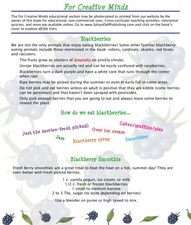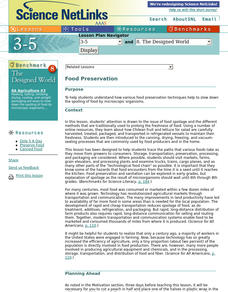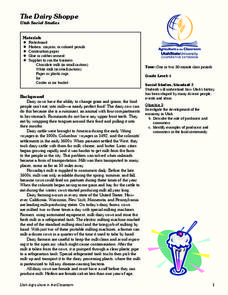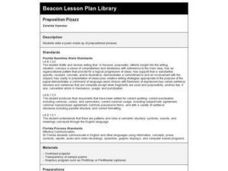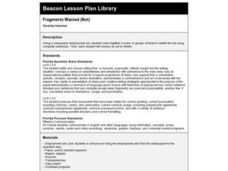Curated OER
pH
Learners use a Colorimetric test to measure pH and gain the importance to life in an aquatic ecosystem pH is. They explore the dramatic effect pH level can have on a water body. Students test the pH level of many water samples.
Curated OER
Blackberries
Students read and answer questions about other animals that like blackberries besides humans. In this blackberries lesson plan, students read about what animals like to eat blackberries and what they do for them.
Curated OER
America's Heartland
Students complete geography and trade activities about global trade. For this geography and trade lesson, students read information to learn about absolute advantage, comparative advantage, trade factors, U.S. trade partners, and...
Curated OER
A Day at the Market
Students describe role of market place in 18th-century Virginia, explain how trade and economy were part of young person's educational process,
take part in the classroom marketplace, and compare shopping in colonial times and as part...
Curated OER
Sorting
Pupils explore how books are sorted in a library. In this sorting lesson, students play a game where they have to fill the shelves with books that share a common theme. Pupils compare this game to a real library. Students discuss how a...
Curated OER
Biotech in a Bag
Learners carry out a series of experiments using self-locking plastic baggies. Each experiment demonstrates a phenomenon or principle of biotechnology.
Curated OER
Nothing New? A Physical Change
Fifth graders discuss the differences between chemical and physical changes. In groups, they complete experiments and discover how a physical chnage can be reversed. To end the lesson, they review the steps of the water cycle and...
Curated OER
Corn Field Math
Learners complete problems dealing with whole numbers, fractions and percents. After exploring the history of corn and related farming vocabulary, students work in pairs to solve multi-step problems. They incorporate the use of number...
Curated OER
The Dairy Shoppe
Fifth graders research dairy farming and learn about dairy products as well as dairy processing. In this dairy lesson, 5th graders read background information about dairy farming and processing. Students discuss running a small business...
Curated OER
Corn in Legend and Myth
Seventh graders compare myths and legends about corn and use creative abilities to act them out. In this corn legends lesson, 7th graders read background information about corn and its importance. Students work in groups to research...
Curated OER
Battery Type and Size
Students identify the different types of batteries available in the market. In this science lesson, students discuss how to select the right batteries for a car.
Curated OER
Mushroom
Students identify the different types of mushrooms. In this biology lesson, students explore different mushroom experiments they can do at home. They discuss ways to extend sliced mushrooms' shelf life.
Curated OER
Mushroom Prints
Students create a mushroom spore design on paper while studying the facts on fungi.
Curated OER
Let it Grow!
Pupils explain the relationship of plants and animals in the environment. They name the basic requirements for plant growth and define the terms photosynthesis, stomata, chlorophyll and xylem.
Curated OER
Oh, Say Can You See
Pupils explore different parts of the eye and functions of each part through a video and a dissection of a cow's eye. They discover different causes of blindness.
Curated OER
Where No Student Has Gone Before
Young scholars create a story about an unknown planet invaded by humans as a pre-reading activity for the novel, A Wrinkle In Time. They discuss good versus evil, and identify examples of the theme good vs. evil in books, film, and their...
Curated OER
Sidewalks to Success in Middle School
Students write a brochure that educates incoming middle school students on how to succeed.
Curated OER
Preposition Pizazz
Young scholars examine examples of poems and identify the prepositions in them. They write original poems using prepositional phrases and create illustrations to go with them.
Curated OER
Memory of a Kiss
Third graders read, discuss, and memorize the poem "Jenny Kissed Me." as an example of lyrical poetry. They write a letter to Jenny reliving the memory of her kiss from an elderly person's point of view. They illustrate their poems.
Curated OER
Living Biographies
Third graders create a multimedia slide presentation containing facts, graphics, and sounds relating to a biographical figure based on their reading of a biography or an autobiography. They present their slide presentations before the...
Curated OER
Fragments Wanted (Not)
Learners rewrite newspaper employment ads using complete sentences.
Curated OER
Writing Places
Students brainstorm ideas after being read a poem and then are to write their own poem and read them out loud.
Curated OER
Helpful Microorganisms
Students study how some microorganisms are helpful and practical in foods. They work with microorganism in a number of food, such as yeast in bread and yogurt.
Curated OER
Enzymatic Browning Experiment
Students, in groups, experiment with Heat Blanching, Vitamin C Dip, and Sulfur Dioxide Dip to see if they can prevent enzymatic browning.



